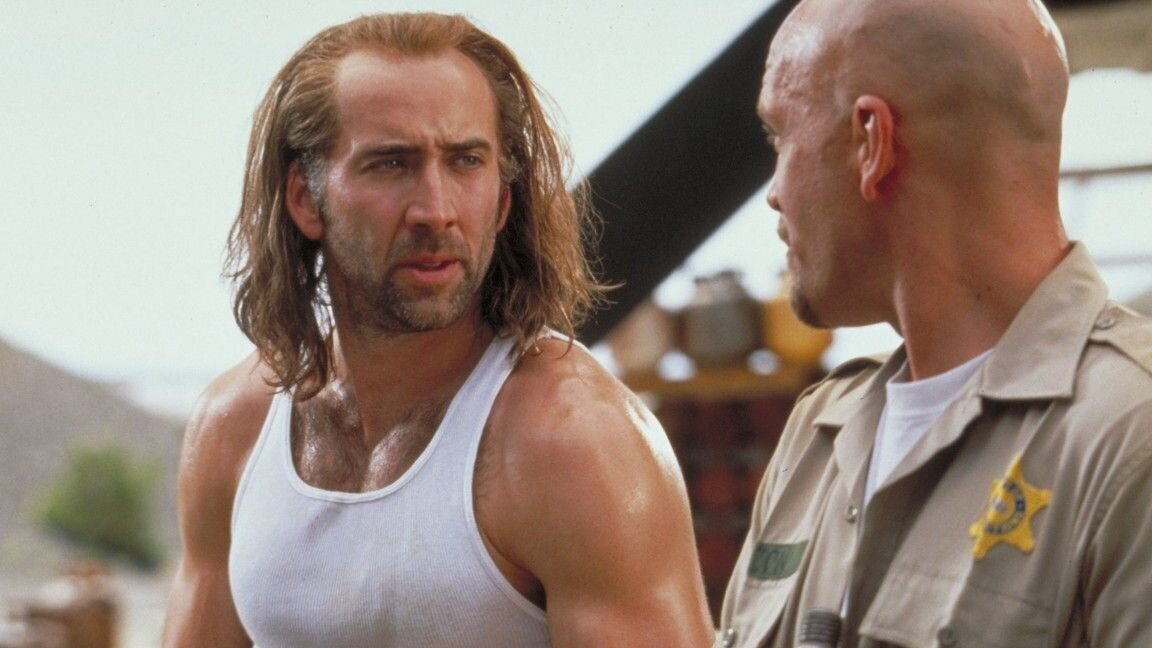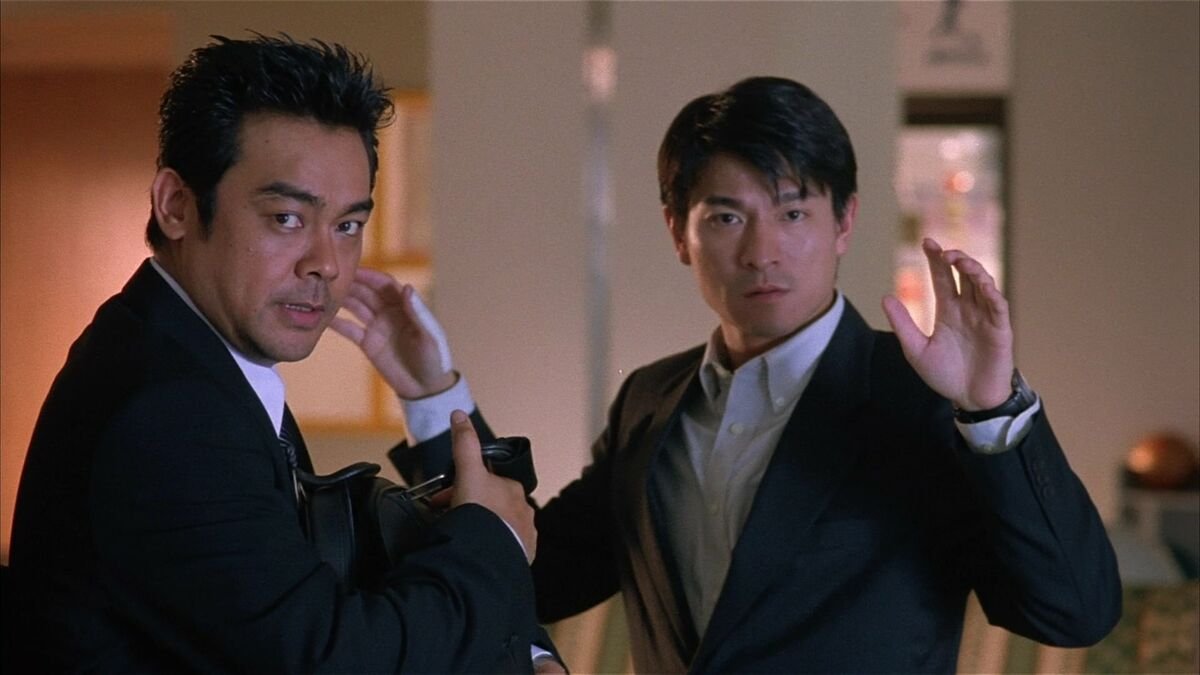Review: Con Air (1997)
Con Air is an imitation of a Michael Bay film. It has the same mixture of aggressive action tropes, absurd plotting, romantic sentimentality, and over-the-top set pieces as his films. However, it is not a film by Michael Bay; it lacks the paradoxically balletic chaos that defines Bay’s formal approach. What’s left is a film that leans into every absurdity of 1990s filmmaking, defining its entertainment ethos, without capturing its art. But it’s pure filmmaking excess the likes of which we don’t see anymore, and therefore, a stupid and entertaining film by virtue of its shameless approach to big-budget filmmaking.
The film follows the hijacking of a prison plane transporting the most dangerous criminals in America from San Quentin to an Alabama supermax, with a stopover in Carson City. The criminals take over the plane and redirect it to a country without an extradition treaty, setting off a chase with US Marshals (John Cusack and Colm Meaney) on their trail. The marshals’ only hope lies in the one good man on the plane: Nicolas Cage’s Cameron Poe, a southern-accented former Army ranger who is serving a term for accidentally killing a man in a bar fight. Poe just wants to get home to see his daughter, Casey (Landry Allbright), whom he has never met as she was born after he started his prison term. But he’s too honourable to flee the plane when he has the chance and instead stays on board to stop the criminals and see justice is served.
Coming only a year after Michael Bay’s The Rock (1996), which surprisingly made Oscar-winner Nicolas Cage into an action star, Con Air takes Cage’s new career trajectory one-step further. Instead of playing the nerdy everyman as he did in The Rock, Cage transforms himself into a bonafide masculine action hero in Con Air, with chiselled abs, a calm demeanor, and an unparalleled ability to kick ass. In the opening moments of the film, he accidentally kills a man in a fight outside a bar while defending the honour of his wife, Tricia (Monica Potter). The fight is a demonstration of just how strong Poe is, as he kills the man with one hit to the head. But despite the fact that the man attacked him first, he’s sentenced to seven-to-10 years in prison.
Poe takes it in stride and remains absurdly positive throughout. Cage imbues him with a Zen-like calm reminiscent of Patrick Swazye’s Dalton and Bodhi—he represents the “soft action hero” of the 1990s, a figure of masculinity defined by his sensitivity, restraint, and the careful application of violence. He’s as strong as the macho action heroes of the 1980s, as demonstrated in the opening fight scene, but he’s punished when he lets that violence get out of control. Thus, his moral restraint is his defining attribute, as it is for many action heroes of the 1990s. Cameron Poe is an absurd character, both impossibly honourable and strong, but Cage makes you believe in the absurdity through his goofy charisma and quiet melancholy, which gives some of the silliest moments in Con Air a strange dignity.
In some ways, Poe is a cartoon, but so many figures in 1990s action movies are cartoons. Con Air is simply more broadly drawn than others, with a cast of criminal monsters that make The Joker seem restrained. John Malkovich’s criminal mastermind, Cyrus “The Virus” Grissom, is the most notable and important of the villains. Malkovich plays Cyrus as a twist on his Oscar-nominated villain from In the Line of Fire (1993), a lethal intellectual with a seriously-petty streak. Malkovich is having a hoot, chewing the scenery and unleashing cheesy one-liners whenever he gets a chance. In many ways, Cyrus creates the stereotype for future Malkovich roles, defined by his amplified performance and witty, bordering on pissy, line deliveries that gesture at a self-awareness of the whole shtick.
The other criminals are no less cartoonish, and the filmmakers trot out a celebrated cast of “that guys” to fill in the rogue’s gallery. These include Ving Rhames as a Black revolutionary terrorist, Dave Chapelle as a smooth-talking career criminal, Danny Trejo as a serial rapist, and, perhaps most memorably, Steve Buscemi as a notorious cannibal serial killer—a bargain bin Hannibal Lecter.
Buscemi’s interactions with the rest of the criminals provide some of the funniest and dumbest moments in the film. When he’s first brought on board, Cyrus praises him: “Love your work.” But the other criminals are leery of him. The filmmakers treat Buscemi’s killer like he’s Lecter. He’s contemptuous of other criminals and insults their idiocy. He’s also strangely philosophical about his crimes and their current situation. When Poe calls him insane, he responds:
Now you’re talking semantics. What if I told you “insane” was working 50 hours a week in some office for 50 years…at the end of which they tell you to piss off? Ending up in some retirement village…hoping to die before suffering the indignity of trying to make it to the toilet on time. Wouldn’t you consider that to be insane?
The absurdity of Con Air is embodied in its approach to Buscemi’s serial killer. On the one hand, the filmmakers want us to blanche at his talk about wearing a woman’s head as a hat. And yet, they also seem to agree with his assessments of the other criminals and his assertion that everything going on in the film is meaningless, trading in the sort of dime store nihilism that was popular at the time. They even give him an absurd ending similar to the chilling close of The Silence of the Lambs where Hannibal Lecter calls Clarice from the Caribbean. However, instead of playing this moment as chilling, like the scene in Lambs, it plays it as a crowd pleasing stinger, where the audience is meant to cheer that Garland got away and is living it up at a casino.
Con Air is upfront and unashamed about its stupidity. Some lines and moments reference its own absurdity, such as Poe’s lament that “They somehow managed to get every creep and freak in the universe onto this one plane. And then somehow managed to let them take it over. And then somehow managed to stick us right smack in the middle.” The film is never winking in the Whedonesque way that would come to define blockbuster action with the Marvel Cinematic Universe, but it’s not impervious to irony like Road House. Instead, it’s simply unabashed, admitting that it’s a dumb film, but using its stupidity as an excuse to have good actors go to town in trashy performances and blow the ever-loving shit out of everything.
As I mentioned off the top, Con Air resembles a Michael Bay film. Or at least, it resembles the contours of a Michael Bay film—it is big, loud, and dumb. What it lacks is the formal prowess of Michael Bay. The director Simon West, best known for this film and Lara Croft: Tomb Raider (2001), does not have Bay’s penchant for perpetual visual motion and expressionistic editing. Think what you will of Bay’s moral approach as a filmmaker, but the man is deniably great at moving a camera. Incapable of elevating any single frame of the film, West doesn’t try to do anything interesting from a formal approach, aside from give you bigger explosions, more witty one-liners, and more absurd moments of violence, such as the climactic crash landing on the Las Vegas Strip. It’s fun, but there’s no artistry to be found.
The entire film can be summed up in the closing credits, which lists the names of the actors overtop images of them laughing in character while Lynyrd Skynrd’s “Sweet Home Alabama” plays. It’s an effect closer to a sitcom opening than the end of a violent action film, as if saying, “Oh, what a great fun ol’ time we’ve had tonight.” Such a homey depiction of serial killers, rapists, and psychotic criminals is icing on the cake of this profundly stupid film. It’s the final declaration that this film is trash and it’s too late to pretend to be anything else, so why not enjoy it as such? As the movie’s tagline so elegantly states, “Buckle Up” and enjoy the ride.
6 out of 10
Con Air (1997, USA)
Directed by Simon West; written by Scott Rosenberg; starring Nicolas Cage, John Cusack, John Malkovich, Steve Buscemi, Ving Rhames, Colm Meaney, Danny Trejo, M. C. Gainey, Dave Chappelle, Mykelti Williamson, Rachel Ticotin, Monica Potter.



George More O’Farrell’s The Holly and the Ivy is a perceptive Christmas drama that deserves a place in the Christmas rotation.